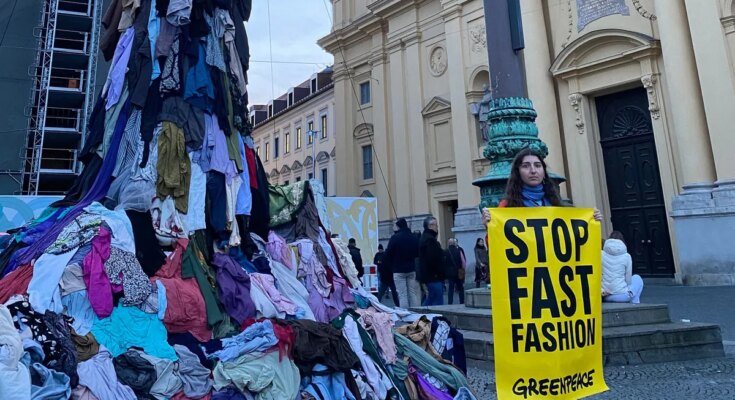Fighting “fast fashion”
Greenpeace dumped a 5 meter high pile of laundry on Odeonsplatz
November 13, 2025 – 17:33Reading time: 2 minutes

Greenpeace Munich is erecting a five-meter-tall statue made from used clothes on Odeonsplatz. This campaign is intended to show the consequences of fast fashion.
Greenpeace Munich built a five-meter-tall statue made from clothing scraps on Odeonsplatz on Thursday to demonstrate anti-fast fashion laws. The installation consists of textiles collected by Greenpeace in Ghana. Large quantities of used clothing from Germany also end up there. The NGO also reports that additional photographs on display provide information about Ghana’s strewn landscape and the consequences of the export of used clothing.
According to Greenpeace, the art campaign is based on the designs of artist Emanuele Jane Morelli. The organization wants to draw attention to the expected discount campaigns of fashion companies and further sales of disposable fashion (“fast fashion”) before Black Week. Activists warned with banners reading “Fast Fashion: Buy Cheap, Pay High”.
Greenpeace calls for anti-fast fashion laws based on the French model. This is intended to introduce special levies on fast fashion products, strengthen the textile circular economy such as second-hand, repair and exchange systems, and prohibit fast fashion advertising on social networks. According to the organization, the legal opinion prepared by Greenpeace confirms that such regulations are also legally possible in Germany.
To justify this, the organization refers to fashion production figures. Global clothing production has tripled since 2000. Up to 180 billion clothing items are produced each year, up to 40 percent of which remain unsold and destroyed. More than 60 percent of used clothing collected in Germany is thrown abroad, often in landfills or rivers.
Nicola Mai from Greenpeace Munich said that fast fashion symbolizes an economic system that wastes resources and means that communities in the south only receive waste from rich countries. “Only strong anti-fashion laws can stop the flood of clothes. Politicians have every legal opportunity to end this madness. They must now take advantage of it.” Manufacturers must ultimately take responsibility for overproduction, disposable fashion, and its impact on the environment and climate.



